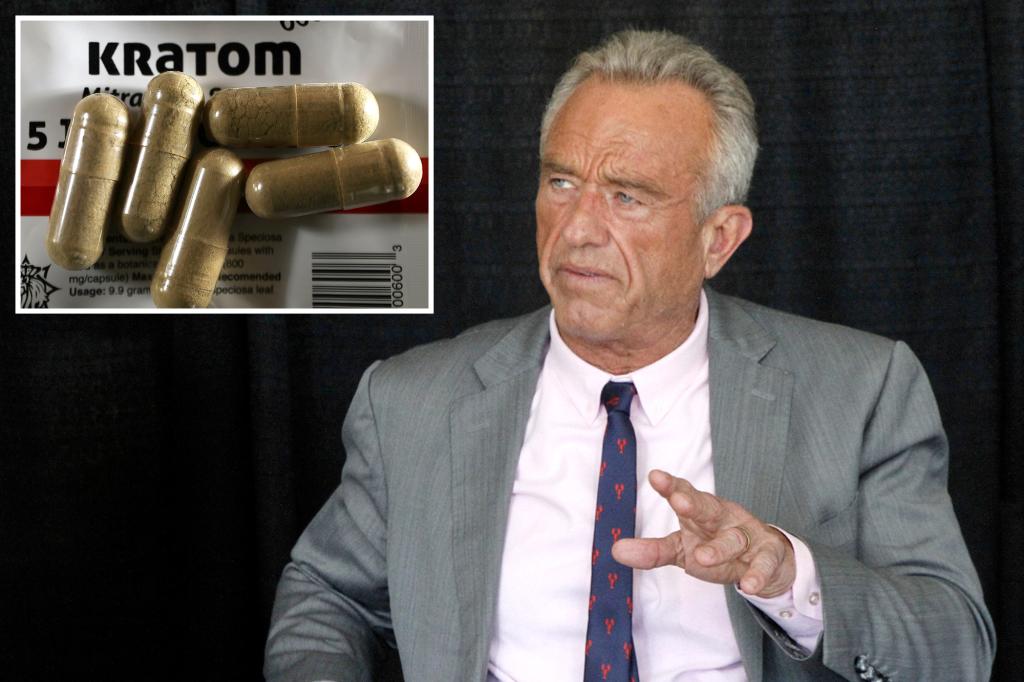Health and Human Services Secretary Robert F. Kennedy Jr. has announced plans to crack down on kratom, a plant ingredient whose opioid-like qualities have rattled health officials.
Kratom is often marketed as a painkiller and energy booster and sold with flashy packaging in gas stations, smoke shops, and liquor stores.
But in recent years, manufacturers have found ways to enhance the potency of a compound in Kratom, 7-OH or 7-hydroxymitragynine, which latches onto opioid receptors in the brain, increasing dependence.
“I became an addict because [heroin] was so available, but I had to go to the South Bronx or the Lower East Side. But now you can go to any gas station,” Kennedy, 71, told reporters during a press conference July 29.
“They’re marketing them to children: They’re gummy bears, they’re bright colors, they’re candy-flavored. This is really a sinister, sinister industry.”
Kennedy and Food and Drug Administration (FDA) Commissioner Dr. Marty Makary announced the FDA would begin pushing to schedule 7-OH as a controlled substance.
From there, the Drug Enforcement Agency will conduct a review and determine whether or not 7-OH will become classified as an illicit drug.
“Let’s be honest,” Makary said. “There’s also a lot we don’t know. This may be the calm before the storm. It may be the tip of the iceberg, but let’s be aggressive and proactive.”
What is kratom?
Extracted from leaves of an evergreen tree native to Southeast Asia, kratom is used as a painkiller and an energy booster in various drinks, powders, gummies and capsules.
Kratom has been used in herbal medicines dating back at least to the 1800s. But the advancements in synthesizing 7-OH have raised red flags.
“7-OH is not just ‘like’ an opioid … it is an opioid,” said Makary, describing the compound as 13 times more potent than morphine. “And yet it is sold in vape stores, in smoke shops, in convenience stores, in gas stations that are popping up around the United States. And no one knows what it is.”
According to the FDA, 7-OH is not lawfully approved as a dietary supplement or food additive, and companies aren’t being truthful if they claim otherwise.
“Consumers who use 7-OH products are exposing themselves to products that have not been proven safe or effective for any use,” the agency warned last month.
The FDA has blasted out warning letters to at least seven companies over products that have 7-OH added to them.
Is kratom legal?
For now, kratom is technically legal, though some states are launching their own crackdown.
At least seven states have already moved to ban kratom: Alabama, Arkansas, Indiana, Louisiana, Rhode Island, Vermont, and Wisconsin.
The FDA also has not approved kratom for us in drugs.
Dangers of kratom and kratom withdrawal
Kratom, particularly with 7-OH, is known to be highly stimulative and addictive.
It can cause symptoms such as rapid weight loss, liver damage, high blood pressure, dizziness, depression, seizures, and more, according to the Mayo Clinic.
Between 2011 and 2017, national poison control centers fielded 1,807 calls about kratom exposures, according to the Centers for Disease Control and Prevention.
Warnings about the addictive nature of kratom have gone viral on social media platforms such as TikTok amid the spread of drinks like Feel Free, a tonic with kratom in it.
Recently, The Post reported on the case of Johnny Loring, who consumed large amounts of kratom and died with high levels of mitragynine and the prescription painkiller gabapentin in his system.
“The level of kratom shocked me. It overwhelmed me. It made my gut sick,” said Loring’s mom, Jennifer Young, after discovering 20 packs of kratom near Loring’s room. “I didn’t realize it was so addicting.”
Read the full article here

